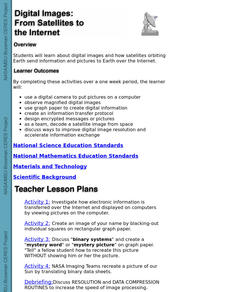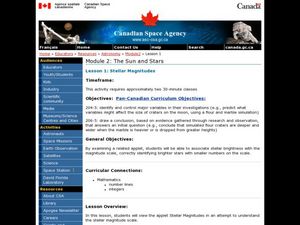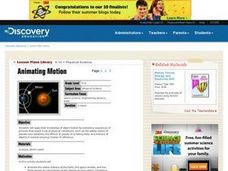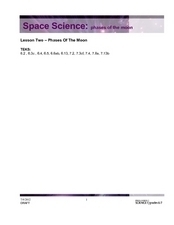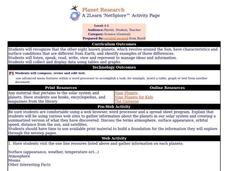Curated OER
Meteor, Meteoroid, Meteorite: What's the Difference?
Young scholars explore the difference between a meteor, meteorite and meteoroid. In this space science lesson, students first read information about these space bodies. Young scholars make Comet Cookies and use them to model a meteor...
Curated OER
The Solar System
Students describe the different bodies that make up our solar system, explain the place of our solar system within the Milky Way Galaxy and the universe, explain day and night and the Earth's movement, and describe the relationship...
Curated OER
Digital Images: From Satellites To The Internet
Students examine digital images and how satellites orbiting Earth send information and pictures to Earth over the Internet. They use a digital camera to put pictures on a computer and decode a satellite image from space.
Curated OER
Try This On For Size!
Students view a video to gather information about our solar system. They create models of the planets to scale and place them in scale relative to their distances from the sun. They also visit a planetarium or use the internet to gather...
Curated OER
The Moon
Learners explore the relationship between the earth, sun, and moon in our solar system. They create a moonrise/moonset chart, perform a dance that models the moon phases, and create a Styrofoam model of the moon's surface.
Curated OER
Stellar Magnitudes
Students analyze the stellar magnitude scale. In this stellar magnitude lesson, students examine the stellar magnitude scale. Students predict the Sun's magnitude from various planets.
Curated OER
Our Solar System
Students analyze the theories of the formation of the universe and solar system. Students analyze planetary motion and the physical laws that explain that motion: Rotation, Revolution, Apparent diurnal motions of the stars, sun, and...
Curated OER
Is it Really Winter in Australia? It is June!
The purpose of this activity is to determine how the location of a place on the Earth (hemisphere) determines what season that place is experiencing relative to the Sun's rays. Day one the young scholars will be introduced to the terms...
Curated OER
Animating Motion
Pupils apply what they recall about objects in motion by animati ng sequences of pictures that model a set of physical conditions. They animate the orbital motions of the Earth, the space shuttle, and the Moon based on calculations of...
Curated OER
Mars Calendar Project
Students design a calendar that displays time on Mars. They explore the differences between time on Earth and time on Mars while making the calendar.
Curated OER
Space Science: Phases of the Moon
Looking for a terrific lesson on the phases of the moon that has lots of good worksheets? With two excellent websites are embedded in the plan, the activity is sure to spark some interest in your astronomy unit. Some common...
Curated OER
Solar System Hall Model
Not novel, but fun, this lesson gets your space science learners to model the size of the planets and the solar system along your school's hallway. Scaled measurements as well as actual distances are provided for both planet diameters...
Curated OER
The Analemma
Middle schoolers describe the relationship between the tilt of Earth's axis and its yearly orbit around the sun, by learning about analemmas. They determine what they can do to show that the sun's position doesn't change, and they find...
Curated OER
Moon Observations
Students study the science of the moon. In this moon observations lesson, students study vocabulary associated with the moon, study a lunar calendar, and a phases of the moon's orbit around the Earth.
Curated OER
Learning Lesson: The Shadow Knows I
Students examine the elevation of the sun to discover the changes in seasons. They observe and measure the length of their shadow. They compare this measurement to one taken four months later.
Curated OER
"Space" Investigations
Sixth graders understand the patterns of change observable on Earth as a result of the movement of the different bodies in the solar system. They identify the physical characteristics of the different components of the solar system.
Curated OER
Planet Research
Young scholars recognize that the other eight known planets, which revolve around the Sun, have characteristics and surface conditions that are different from Earth; and identify examples of those differences.
Curated OER
Exploration of the Moon
In this moon worksheet, high schoolers review the Clementine exploration of the Earth's moon. This worksheet has 8 matching and 14 true or false questions.
Curated OER
Fact and Opinion
Facts and opinions are clearly defined in this organized PowerPoint. Following the definitions are a few examples that students must identify as facts or opinions. Tip: After viewing this presentation, ask students to share some of their...
Curated OER
Asteroid, Comet, or Meteor?
In this asteroid, comet and meteor worksheet, students complete a chart by determining which of 8 given characteristics belong to asteroids, comets or meteors.
Curated OER
Angular Size and Velocity
For this distance worksheet, students calculate the angular size or angular diameter of objects at a given distance. This worksheet has 6 problems to solve.
Curated OER
Planet Cards
In this science card activity, students cut out the different cards and study the planets Earth, Venus, Mercury, Saturn, Jupiter, Mars, Pluto, Neptune, and Uranus. Students' objective is to learn each planets' orbit, rotation, distance...
Curated OER
Venus
Looking for a good activity to help teach about the planet Venus? This activity is for you! An excellent photograph of Venus accompanies three paragraphs of text. Learners answer five multiple choice questions based on what they've read....
Curated OER
Saturn
Looking for a good worksheet to help teach about the planet Saturn? This worksheet is for you! An excellent photograph of Saturn accompanies three paragraphs of text. Pupils answer five multiple choice questions based on what they've...




